
Undergraduate energy education is often offered from a specific perspective, such as engineering, sustainability, policy, or economics. This essay argues that undergraduate programs in energy should be explicitly interdisciplinary, because issues surrounding energy production, transmission, and use have multiple perspectives. Challenges to creating interdisciplinary energy programs include often-compartmentalized nature of colleges and universities, and employment prospects for broadly-educated graduates that may not be clear. Strategies for overcoming those issues are proposed, but others remain to be developed by leaders in undergraduate energy education.
Continue ReadingEat local. Choose a reusable bag instead of plastic. Put a brick in the toilet. These are intuitively simplistic environmental “solutions” that may do little but make a person feel environmentally virtuous. Energy and environmental science teaching requires us to change students’ preconceived simplistic notions about solving environmental issues if we want these future leaders to make real environmentally effective decisions. Students need to understand that the energy input in a disposable plastic bag is dwarfed by the energy expenditure of driving to the grocery store with a reusable bag, so that they don’t make symbolic, but ineffective decisions. One approach is to have students attempt to develop a “sustainable” product. The complexity of environmental solutions becomes evident when we have to evaluate the energy use and environmental consequences from raw material sourcing to reuse.
Continue Reading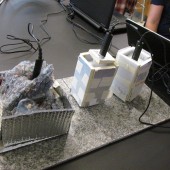
Columbia Water & Light is a municipal electric and water utility with a number of energy education programs. By hiring a full-time education and outreach coordinator, Water & Light has been able to create connections with existing audiences in the community. Historical and current programs have earned awards for the utility. Water & Light’s education programs touch on the science, math and social forces behind energy in the community through projects with adults and children alike. By addressing energy education from a number of angles, Water & Light hopes to provide the community a holistic view of their energy use and how they can improve, with a goal of increasing participation in the utility’s efficiency programs. Short descriptions of a number of programs highlight the work that Water & Light’s education and outreach team has developed over a number of years.
Continue ReadingReimagining energy education involves moving beyond the basics of energy use, conservation, and efficiency toward a more robust exploration of energy. This exploration should address energy access and equity, the impacts of energy choices, and personal attitudes, beliefs, and behaviors related to sustainable energy solutions. One approach to encourage this evolution is to use a learning context that inspires educators and students to delve deeply and methodically into the social, economic, and environmental interconnections of energy issues—in other words, to learn about energy within the context of global sustainability. In this article, we share Facing the Future’s definition of global sustainability education (GSE), explain why GSE is an effective context for energy education, and use Facing the Future’s newest energy curriculum to demonstrate how GSE can be employed to develop engaging and rigorous interdisciplinary energy curriculum.
Continue Reading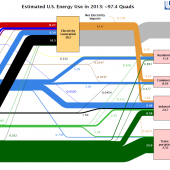
Energy services undergird all modern, industrial societies, yet economies based on fossil fuels are not sustainable. Insecurity of supply, particularly of oil, has sparked major geopolitical tensions and warfare. Pollution from use of fossil fuels and other energy sources has damaged local, regional, and global health. Greenhouse gases from fossil fuels have triggered concerns about the earth’s climate. Educational institutions are responding only slowly to these existential threats. This paper addresses the challenges facing students, faculty, and administrators as institutions move from simply providing technical education on the respective components of the energy industries to a more comprehensive program that also addresses the environmental, political, economic, cultural, and ethical contexts of energy literacy. Students at most institutions lack courses and programs outside of engineering and physical science. Only 8 percent of 1638 institutions have systematic, broad-based energy studies. The U.S. Department of Energy has supported initial efforts to develop this field. Development includes helping students move from energy studies to employment. Nevertheless, student interest is high. Faculty teaching sustainable energy have generally self-taught, and faculty employment opportunities in energy studies seldom exist. A faulty member delivering energy studies generally lacks a community of supporting peers. Those in this interdisciplinary field may fear the effort will not be rewarded by the institution. Nevertheless the intellectual rewards from developing energy studies are significant and motivating. Administrators face questions of balancing competing claims for institutional resources and face criticism from internal and external constituencies. In addition, they must guide the institution to promoting, enabling, and rewarding interdisciplinary work. Development of energy studies, however, positions the institution for better internal operations and for meeting critical societal needs. We conclude that energy education is both easy and hard, but it can and must be done.
Continue Reading
As sustainability educators and communication professionals consider various strategies to engage audiences with regard to household energy use, one option now seemingly available is to leverage social networks by encouraging people to share information with others they know. At the same time, we currently do not know enough about the potential spread of energy-related information in this fashion. Whether, when, or how people share energy-related information with peers or family members are crucial questions, for example. Using national survey data from U.S. residents (n=816), we predicted energy information sharing as a function of objective energy knowledge (measured using a factual energy knowledge index), perceived energy understanding, and demographic variables. Our analyses underscored the importance of assessing not only factual energy knowledge but also perceived understanding, as both are equally predictive of energy information sharing frequency (β=.11, p<.05, for objective knowledge and β=.11, p<.01 for perceived understanding). Number of children also predicted energy information sharing, β=.11, p<.01. We discuss the implications of these results for informal energy education efforts in the 21st century.
Continue Reading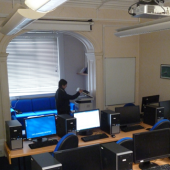
This study investigated the current energy use perceptions and practices of staff and students within five buildings at the University of Sheffield, UK. A series of focus groups with staff and post-graduate representatives from these buildings explored occupant awareness of energy consumption, perceived level of control over energy use, priorities for reduction and the perceived facilitators and barriers to reduction. Overall, personal awareness and attitudes about the need to conserve energy, the perceived actions and opinions of other users (including University authorities) and perceptions of control over the ease and opportunity to reduce energy consumption were perceived by occupants to relate to whether they would intend to conserve energy in University buildings. Recommendations for encouraging energy conservation focus on engendering greater occupant responsibility for conservation by providing a clear conservation message, participating in energy reduction schemes and providing greater energy usage information. Few papers have investigated occupant understanding of energy use in UK University and Higher Education buildings, despite large reduction targets in the sector. This paper recognises the importance that staff and student engagement will have in the successful achievement of these targets and explores their insights and perceptions.
Continue Reading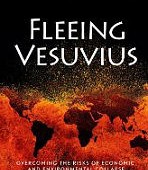
In this concise and useful review, Tina Evans brings forth the high points of Douthwaite and Fallon’s comprehensive book about economic collapse, especially featuring those aspects of the book that might contribute to courses on sustainability and peak oil.
Continue Reading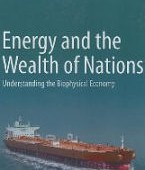
In this insightful review, Tina Evans makes the case for Hall and Klitgaards’ work as going beyond more superficial ecological economic analysis into a deeper realm of biophysical economics where human economies do not just depend on a natural resource base, but are part of it. She is impressed by how thoroughly the book delves into the many theoretical and interdisciplinary aspects of biophysical economics, while engaging the reader and presenting a coherent common theme throughout.
Continue Reading
In this thoughtful, and fundamentally practical, down-to-earth essay, Christopher Haines puts architects squarely on the front-lines of sustainability education. He shows us, with real applications based on thoughtful inter-disciplinary analysis, how the complexities an architect faces in designing a building extend their tentacles into every aspect of sustainability—from environment to economics to social and psychological considerations.
Continue Reading